
Signs You Need a Dental Crown
Getting a dental crown is a fairly standard procedure. However, many people do not know they need a dental crown. This post will provide information about dental crowns and detail specific warning signs that may indicate you need one.
What Is a Crown on Your Tooth?
Before diving into the signs that you need one, let's first explain what crowns are. Dental crowns are caps placed over the top of damaged teeth. Crowns can consist of various materials, typically resin, porcelain, metals or ceramics. Though dental crowns are caps and not natural teeth, you must still practice good dental hygiene.
Why Would You Need a Dental Crown?
Over time, teeth can become injured through physical damage, decay and several other reasons. Dental crowns can protect teeth from further damage, and also give you a great smile!
Dental Crown FAQs
Here are some of the most frequently asked questions from patients wondering if they are good candidates for a dental crown.
- Do crowns hurt? When applied to your tooth by an experienced dental professional, crowns are safe and painless.
- What are crowns made of? Crowns consist of ceramic, porcelain or metal alloys.
- Are crowns permanent? Crowns serve as a permanent cap that fully encloses your original tooth. However, without correct maintenance, your crown might become loose and fall out.
- Why do I need a crown? Your dentist might recommend a crown if you have dental problems such as weakened, cracked or misshapen teeth.
- What is the difference between a crown and a filling? A filling is a typical procedure used to treat cavities by filling in the hole with a material such as gold. In contrast, a crown is a cap placed over your original tooth.
- Can I get a filling instead of a crown? Your dentist may suggest getting a crown vs. a filling if you have more extensive tooth decay or in instances when adding filling to a tooth would weaken it.
- How does a dental crown work? A crown can brighten your smile, strengthen your bite and make your teeth appear more symmetrical. If you're experiencing discomfort related to damaged or decayed teeth, a crown might provide you with some relief.
Dental Crowns Compared to Other Procedures
As previously mentioned, dental crowns are caps that dentists place on damaged teeth. But how do crowns compare to other dental procedures? Here are some other techniques and how they differ from dental crowns.
- Tooth filling: Fillings are very different from dental crowns. Instead of placing a cap on a damaged tooth, a dentist will “fill” the tooth with a material. This material could be gold, plastic, resin, porcelain or many others. Dentists usually use fillings to treat cavities. In a typical tooth-filling procedure, the dentist will first numb the area with an anesthetic, clean the cavity and inject the filling.
- Root canal: Root canals are another prevalent dental procedure that is different from dental crowns. In a root canal procedure, the dentist removes the soft center of the tooth. Root canal surgery is often necessary when cavities go untreated or a tooth has become chipped or cracked.
- Bonding: Bondings are standard procedures that are akin to dental crowns in some ways. Bonding is a way of repairing damaged teeth. You may want a bonding if your teeth are discolored, crooked or slightly chipped. In this procedure, a dentist will place a white filling on your teeth that will then “bond” and improve in appearance.
- Dental bridge: Unlike dental crowns that involve placing a cap on an injured tooth, bridges fill the gaps between missing teeth. Bridges consist of two or more artificial teeth, and there are three primary types available — transitional, cantilevered and resin-bonded.
- Dental implant: Dental implant surgery involves replacing tooth roots with metal posts to replace damaged or missing teeth. Someone may require dental implants for many reasons, including an inability to wear dentures or the desire to improve your speech. This surgery is much more invasive than a standard dental crown procedure.
Do Not Be Afraid of Getting Dental Crowns
Many people are afraid of undergoing a dental crown procedure, but there is no reason to fret. Crown procedures are incredibly safe, and most dentists have years of experience.
Some patients worry that dental crowns are toxic, but this is not the case. Manufacturers use nontoxic metals to make crowns. Here are a few examples.
- Zirconia: Zirconia is a popular metal to make crowns from because the material is entirely ceramic, and many people consider the color to be visually pleasing. Another benefit of crowns made from zirconia is that they are more corrosion-resistant than other metals.
- Gold: Gold is another nontoxic metal used to make dental crowns. Dentists often use gold crowns to treat patients whose teeth are deteriorating due to grinding or heavy chewing.
- Nickel: Before giving nickel-based crowns to a patient, dentists will first do a test to make sure they are not allergic to the metal.
Interestingly, crowns are safer than many other dental procedures like fillings, which may contain toxic materials like mercury.
Benefits of Dental Crowns
There are many benefits to getting dental crowns. Here are some of the most notable ones.
- Restoration: Dental crowns are ideal for restoring chipped, eroded or damaged teeth.
- Permanence: Another benefit of dental crowns is that they are typically permanent, which means you do not have to get a new crown every few years or so. Compared to other dental procedures like fillings and inlays, dental crowns tend to be more durable.
- Confidence: Having damaged teeth can be embarrassing. However, with the help of dental crowns, you can restore your teeth and have a better smile, which is sure to boost your self-esteem.
- Dead teeth protection: Dental crowns are also great for protecting dead teeth after surgery. If you have a dead tooth, a dentist will remove the pulp through a root canal. The dentist can then restore the tooth by either using a filling or giving the patient a dental crown. In most cases, dental crowns are the better option.
- Protection purposes: Dental crowns do not only protect dead teeth. Having a dental crown on a chipped tooth can protect it from further damage because crowns are so durable.
- Customization: One of the best things about dental crowns is that they are customizable. Most dentists will allow patients to decide what nontoxic metal they want used to make the crown. After the patient selects a material, the dentist will design the crown to create a perfect fit.
- Simple procedure: Some people believe a dental crown procedure is invasive and painful, but that is generally not the case. The process is usually quick and pain-free.
- Fast recovery time: It is best to avoid particularly hard, crunchy foods immediately after the dental crown procedure, but patients can resume their oral hygiene routines shortly after receiving the crown.
- Improved chewing: Because crowns are so durable, it will be easier to chew than it was with your previously damaged tooth.
- Stain resistance: Though dental crowns are prone to staining, they are less likely to stain than natural teeth.
Dental Crown Procedure
Getting a dental crown is a relatively simple procedure, but there are still a few steps.
- During your first visit, the dentist will check the tooth's root and bone through a series of X-rays to determine if it is also necessary to conduct a root canal.
- Next, your dentist will apply anesthesia to the tooth and the surrounding area.
- Then, the dentist will file the tooth to smooth it and prepare it for crown placement.
- Having prepared the tooth, the dentist will use a material such as putty to make an impression of the tooth that will eventually receive the crown.
- The dentist will send the impression to a lab so a technician can design a crown to fit the tooth.
- Sometimes a dentist will apply a temporary crown while waiting for the permanent crown to arrive.
- After receiving your completed crown, the dentist will remove the temporary crown and replace it with the permanent one.
- Having ensured the permanent crown's secure position in your mouth, the dentist will clear you to resume your day.
Dental Crown Maintenance
Maintaining your new crown is relatively straightforward, but here are some recommendations to be safe:
- Brush your crown and teeth gently twice a day for about two minutes.
- Carefully floss so you do not accidentally dislodge your crown.
- Avoid chewing ice with your crown.
- Consider purchasing a mouth guard, so you do not damage your crown in your sleep.
- Schedule a cleaning appointment with your dentist every six months.
- It isn't strictly necessary, but you may want to have X-rays of your crown a couple of times a year to ensure it is still secure.
Signs You Need a Dental Crown
There are many indications you may need a dental crown. Here are some of the most typical ones.
- Fractured teeth: Cracked teeth might be the most obvious sign you need a dental crown. Many health concerns come from fractured teeth, including temperature and pressure sensitivity. You could also cut your tongue if you are not careful. Perhaps the most significant health concern associated with fractured teeth is that you risk infection. To be safe, it is best to get a dental crown to avoid any of these health issues.
- Decayed teeth: Decayed teeth can lead to many problems, including gum disease. If you are experiencing tooth decay, your dentist may recommend using a dental crown instead of a filling to help solve the problem.
- Advanced cavities: Typically, dentists treat cavities with dental fillings. However, some cavities are too advanced and may require a dental crown to remedy the situation. The dentist will ultimately decide whether to use a crown or filling, but for larger cavities that can weaken the tooth, a dental crown is often the better choice.
- Weak teeth: Teeth can be weak without being chipped or fractured. Weak teeth result from factors such as diet, genetics, your environment and specific health conditions. If you have a weak tooth, a durable, easy-to-apply dental crown is one of the best ways to strengthen it.
- Bruxism: Bruxism is the medical term for grinding your teeth, which could lead to teeth problems. Many people unconsciously grind their teeth during sleep. If your teeth have suffered due to bruxism, it could be a sign that you need a dental crown.
- Stained teeth: Having stained teeth is another sign you could use a crown. Tooth stains result from habits like using tobacco products and drinking alcohol and high-sugar beverages. Teeth stains can also happen naturally as you age. Adding a crown to stained teeth can make them appear whiter and strengthen the tooth.
- Broken cuspids: Your canine teeth, or cuspids, are responsible for biting and tearing food. If these teeth break, it is best to get a dental crown to repair them.
- Dental implants: Patients will initially have spaces from missing teeth soon after they receive dental implants. You can get crowns to fill these spaces.
- Root canal: If you previously had a root canal, it could be a sign you need a dental crown. After your dentist removes the pulp during a root canal, it could leave your tooth hollow and weak. If so, consider having a dental crown procedure to shore it up.
- Misshapen teeth: Teeth can become misshapen over time or because of injury. If you have misshapen teeth, it could be a sign that you need a dental crown. Misshapen teeth, much like broken or fractured teeth, are often weak and require extra support. Luckily, you can have a dental crown placed on the misshapen tooth to resolve the issue.
- Better smile: Dental crowns are one of the best ways to improve your smile. Being embarrassed or ashamed of your teeth can cause you to lose confidence. However, dental crowns can help enhance your smile in ways you previously thought were impossible. With dental crowns, you can repair fractured teeth and make them even stronger than before.
OmniFoam From EverSmile
After you receive a dental crown, implant or bridge, you must be sure to practice good oral hygiene. Without correct hygiene, conditions like peri-implantitis can occur.
Peri-implantitis can lead to inflammatory conditions that affect the hard and soft gum tissues around dental implants and crowns. Much like natural teeth, bacteria can grow on artificial teeth, inflaming the area and causing pain.
To avoid peri-implantitis symptoms following dental surgery, we recommend using a dental implant cleaner when cleaning your teeth. OmniFoam from EverSmile is one of the best of these products on the market. OmniFoam has many benefits and features. Here are a few:
- This product fights peri-implantitis.
- Omnifoam removes biofilm and buildup in margins and around gums.
- This cleaner kills 99% of bacteria.
At EverSmile, we design all our products to make healthier smiles available to everyone. To learn more about what we offer, visit our website.
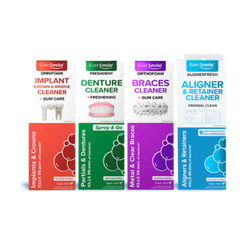
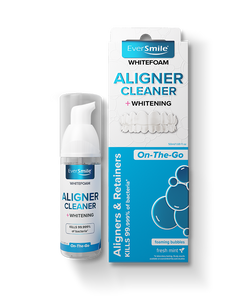
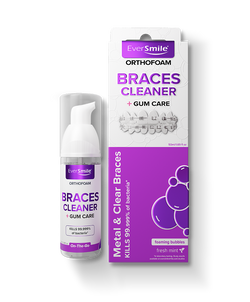
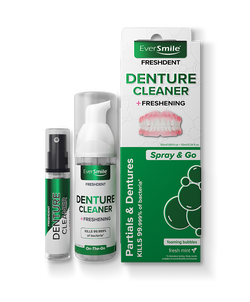
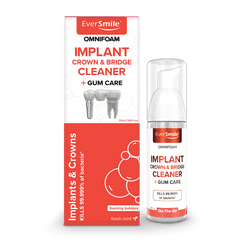
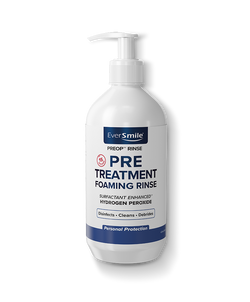





Post a Comment!